- Home
- Robert E. Howard
El Borak and Other Desert Adventures Page 14
El Borak and Other Desert Adventures Read online
Page 14
This interview was likewise on the Amir’s mind as he entered a large lamp-lit chamber and crossed toward a gold-barred window that overlooked the sleeping city. It was the first rift in his relationship with the American, who acted as unofficial advisor, counsel, ambassador and secret service department. Hedged in by powerful nations which used his mountain kingdom as a pawn in their game of empire, the Amir leaned heavily on the western adventurer who had proved his reliability scores of times.
The Amir frowned, from his troubled spirit, glancing idly at a curtain which masked an alcove and absently reflecting that the wind must be rising, since the tapestry swayed lightly. He glanced at the gold-barred window and instantly went cold. The light curtains there hung motionless. Yet the hangings over the alcove had stirred —
The Amir was a powerful man, with plenty of personal courage. Almost instinctively he sprang, seized the tapestries and tore them apart — a dagger in a dark hand licked from between them and smote him full in the breast. He cried out as he went down, dragging his assailant with him. The man snarled like a wild beast, his dilated eyes glaring madly. His dagger ribboned the Amir’s khalat, revealing the mail shirt which had saved the ruler’s life more than once.
Outside a deep shout echoed the Amir’s lusty yell for help, and booted feet pounded down the corridor. The Amir had grasped his attacker by the throat and the knife-wrist, but the man’s stringy muscles were like knots of steel. As they rolled on the floor the dagger, glancing from the mail shirt, fleshed itself in arm, thigh and hand. Then, as the bravo heaved the weakening ruler under him, grasped his throat and lifted the knife again, something flashed in the lamp-light like a jet of blue lightning, and the murderer collapsed, split to the teeth.
“Your majesty — my lord — !” The Sikh was pale under his black beard. “Are you slain? Nay, you bleed! Wait!”
He thrust the corpse aside and lifted the Amir. The ruler was gasping for breath and covered with blood, his own and his attacker’s. He sank on a divan, and the Sikh began to rip strips of silk from the hangings to bind his wounds.
“Look!” the Amir gasped, pointing. His face was livid, his hand shook. “The knife! The knife!”
It lay glinting dully by the dead man’s hand — a curious weapon with three blades sprouting from the same hilt. Lal Singh started and swore beneath his breath.
“The Triple-Bladed Dagger!” panted the Amir, fear flooding his eyes. “The kind of knife that slew the Sultan of Turkey! The Shah of Persia! The Nizam of Hyderabad!”
“The mark of the Hidden Ones!” muttered Lal Singh, uneasily eyeing the ominous symbol of the terrible cult which within the past year had struck again and again at the men occupying the high places of the east.
The noise had roused the palace; men were running down the corridors, shouting to know what had occurred.
“Shut the door!” exclaimed the Amir. “Admit no one but the major domo of the palace.”
“But we must have a physician, your majesty,” protested the Sikh. “These wounds will not slay of themselves, but the dagger might have been poisoned.”
“Then send someone for a hakim. Ya Allah! The Hidden Ones have marked me for doom!” The Amir was a brave man, but his experience had shaken him terribly. “Who can fight the dagger in the dark, the serpent underfoot, the poison in the wine-cup?
“Lal Singh, go swiftly to El Borak’s house and tell him I have desperate need of him! Bring him to me! If there is one man in Afghanistan who can protect me from these hidden devils, it is he!”
Lal Singh saluted and hurried from the chamber, shaking his head at the sight of fear in the countenance where fear had never before showed.
There was cause for the Amir’s fear. A strange and terrible cult had risen in the East. Who they were, what their ultimate purpose was, none knew. They were called the Hidden Ones and they slew with a three-bladed dagger. That was all that was known about them. Their agents appeared suddenly, struck and disappeared, or else were slain, refusing to be taken alive. Some considered them to be merely religious fanatics. Others believed their activities to possess a political significance. Lal Singh knew that not even Gordon had any definite information about them. But he was confident of the American’s ability to protect the Amir, even from these subtle fiends.
Three days after his hurried departure from Kabul, Gordon sat cross-legged in the trail where it looped over the rock ridge to follow the slope down to Khor village.
“I stand between you and death!” he warned the man who sat opposite him.
This man tugged his purple-stained beard reflectively. He was broad and powerful and his Bokhariot girdle bristled with dagger hilts. And he was Baber Khan, chief of the fierce Ghilzai, and absolute overlord of Khor and its three hundred wild swordsmen.
But there was no hint of arrogance in his answer.
“Allah favor thee! Yet what man can pass the spot of his death?”
“I offer you an opportunity to make your peace with the Amir.”
Baber Khan shook his head with the fatalism of his race.
“I have too many enemies at the royal court. If I went to Kabul the Amir would listen to their lies. He would set me on a stake, or hang me up in an iron cage for the kites to eat. Nay, I will not go!”
“Then take your people and find another abode. There are places in these Hills where not even the Amir could follow you.”
Baber Khan glanced down the rocky slope to the cluster of mud-and-stone towers that rose above the encircling wall of the same substance. His thin nostrils expanded and into his eyes came a dark flame like that of an eagle which surveys its aerie.
“Nay, by Allah! My clan has held Khor since the days of Akbar. Let the Amir rule in Kabul. This is mine!”
“The Amir will likewise rule in Khor,” grunted Yar Ali Khan, squatting behind Gordon, with Ahmed Shah.
Baber Khan glanced in the other direction where the trail disappeared to the east between jutting crags. On these crags bits of white cloth were blown out on the sharp wind, which the watchers knew were the garments of the riflemen who guarded the pass day and night.
“Let him come,” said Baber Khan grimly. “We hold the valley.”
“He’ll bring five thousand men, with artillery,” warned Gordon. “He’ll burn Khor and take your head back to Kabul.”
“Inshallah,” agreed Baber Khan placidly, indomitably fatalistic.
As so often in the past Gordon fought down a rising anger at this invincible Oriental characteristic. Every instinct of his strenuous nature was a negation of this inert philosophy. But just now the matter seemed at a dead-lock, and he said nothing, but sat staring at the western crags where the sun hung, a ball of fire in the sharp windy blue.
Baber Khan, supposing that Gordon’s silence signified recognition of defeat, dismissed the matter with a casual wave, and said: “Sahib, there is something I desire to show you. Down in yonder ruined hut which stands outside the village wall, there lies a dead man, the like of which was never seen by me or any other man of Khor. Even in death he is strange and evil, and I think he is no natural man at all, but a—”
The sharp spang of a rifle-shot echoed among the crags to the east, and instantly all four men were on their feet, facing that way.
A shift in the wind brought the sound of angry shouting to them. Then a figure appeared on the cliffs, leaping agilely from ledge to ledge. He danced like a mountain devil, brandishing his rifle; his ragged cloak whipped out on the wind.
“Ohai, Baber Khan!” he yelled, straining above the gusts. “A Sikh on a foundered horse is beyond the pass! He demands speech with the lord El Borak!”
“A Sikh?” snapped Gordon, stiffening. “Let him in, at once!”
Baber Khan relayed the command in a bellow that vibrated among the cliffs, and the man swarmed back up the ledges. Presently a man appeared in the pass on a horse which seemed ready to drop at each step. Its head dropped and its coat was plastered with foam and sweat.
#x201C;Lal S
ingh!” ejaculated Gordon.
“By Krishna, sahib,” the Sikh grimaced as he slid stiffly to the ground. “Well are you named El Borak the Swift! I do not think you were more than an hour ahead of me when I rode through the Kabul gate, but strive as I would, on a fresh horse seized at every village I passed, I could not overtake you.”
“Your news must be urgent, Lal Singh.”
“It is, sahib,” the Sikh assured him. “The Amir sent me after you to beg you to return instantly to Kabul. Sahib, the Triple-Bladed Dagger has struck at the Amir!”
Gordon’s hard body tensed like that of a panther that scents peril. “Tell me about it!” he commanded, and in a few terse words Lal Singh told of the attack on the Amir.
“At your quarters I learned you had departed for Khor,” said Lal Singh. “I returned to the palace and the Amir urged me to follow you and bring you back. He was sick of his wounds, and nearly dead with terror.”
Gordon asked: “Did he say anything about the expedition he planned to lead against Khor?”
“Nay, sahib. But I think he will not leave the palace until you return. Certainly not until his wounds heal, if indeed he does not die of the poison with which the dagger blades were smeared.”
“You have received a reprieve of Fate,” said Gordon to Baber Khan, and to Lal Singh he said: “Come down to the village, eat and sleep. We’ll start for Kabul at dawn.”
As the five men started down the slope, with the weary horse plodding behind them, Baber Khan glanced at Gordon, and asked: “What is your thought, El Borak?”
“That somebody’s pulling strings in Constantinople, or in Moscow, or in Berlin,” answered the American.
“So? I deemed these Hidden Ones mere fanatics.”
“More than that, I fear,” said Gordon. “Apparently it’s a secret society with anarchistic principles. But I’ve noticed that every ruler who’s been killed or attacked has been an ally or a friend of the British empire. So I believe some European power is behind them.
“But what were you going to show me?”
“A corpse in a broken hut!” Baber Khan turned aside and led them toward the hovel. “My warriors came upon him lying at the base of a cliff from which he had fallen or been thrown. I made them bring him here, but he died on the way, babbling in a strange tongue. My people feared it would bring a curse on the village. They deem him a magician or a devil, and with good cause.
“A long day’s journey southward, among mountains so wild and barren not even a Pathan could dwell among them, lies a country we call Ghulistan.”
“Ghulistan!” Gordon echoed the sinister phrase. “In Turkish or Tatar that means Land of Roses, but in Arabic it means The Country of the Ghouls.”
“Aye, the Land of Ghuls; an evil region of black crags and wild gorges, shunned by wise men. It seems uninhabited, yet men dwell there — men or demons. Sometimes a man is slain or a woman or child stolen from a lonely trail, and we know it is their work. We have followed, have glimpsed shadowy figures moving through the night, but always the trail ends against a blank cliff through which only a demon could pass. Sometimes we have heard the voice of the djinn echoing among the crags. It is a sound to turn men’s hearts to ice.”
They had reached the ruined hut, and Baber Khan pulled open the sagging door. A moment later the five men were bending over a figure which sprawled on the dirt floor.
It was a figure alien and incongruous; that of a short, squat man, with broad, square, flat features, colored like dark copper, and narrow slant eyes — an unmistakable son of the Gobi. Blood clotted the thick black hair on the back of his head, and the unnatural position of his body told of broken bones.
“Has he not the look of a magician?” said Baber Khan uneasily.
“He’s a Mongol,” answered Gordon. “There are thousands like him in the land from which he came, far to the east, and they’re no magicians. But what he was doing here is more than I can say —”
Suddenly his black eyes blazed, and he snatched and tore the bloodstained khalat away from the squat throat. A stained woolen shirt came into view, and Yar Ali Khan, looking over Gordon’s shoulder, grunted explosively. On the shirt, worked in thread so crimson it might at first glance have been mistaken for a splash of blood, appeared a curious emblem: a human fist grasping a hilt from which jutted three double-edged blades.
“The Triple-Bladed Knife!” whispered Baber Khan, recoiling from that dread symbol which had come to embody a harbinger of death and destruction to the rulers of the East.
All looked at Gordon, but he said nothing. He stared down at the sinister emblem trying to capture a vague train of associations it roused — dim memories of an ancient and evil cult which used that same symbol, long ago.
“Can you have your men guide me to the spot where you found this man, Baber Khan?” he asked at last.
“Aye, sahib. But it is an evil place. It is in the Gorge of Ghosts, close to the borders of Ghulistan, and —”
“Good. Lal Singh, you and the others go and sleep. We ride at dawn.”
“To Kabul, sahib?”
“No. To Ghulistan.”
“Then you think —”
“I think nothing — yet; I go in search of knowledge.”
II
THE BLACK COUNTRY
Dusk was mantling the jumbled sky-line when Gordon’s Ghilzai guide halted. Ahead of them the rugged terrain was broken by a deep canyon and beyond the canyon rose a forbidding array of black crags and frowning cliffs. The change from grey shale, brown slopes and reddish stone was abrupt, as if the canyon marked a distinct geographical division. Beyond the gorge there was nothing to be seen except a wild, hag-like chaos of broken black rock.
“There begins Ghulistan,” said the Ghilzai, and his hawk-eyed, hook-nosed comrades instinctively loosened their knives and clicked the bolts of their rifles. “Beyond that gorge, the Gorge of Ghosts, begins the country of horror and death. We go no further, sahib.”
Gordon nodded, his keen gaze picking out a trail that looped down rugged slopes into the canyon. It was the fading trace of an ancient road they had been following for many miles, but it looked as if it had been used frequently, and lately.
The Ghilzai nodded, divining his thought.
“That trail is well-traveled. By it the demons of the black mountains come and go. But men who follow it will not return.”
Yar Ali Khan tugged his beard truculently and jeered, though he secretly shared their superstitions. “Demons? What need demons with a trail?”
“When demons take the shape of men they might walk like men,” Ahmed Shah grunted in his bushy beard. Lal Singh the Sikh was imperturbable. His own mythology was full of myriad-limbed demons, but he had scant respect for the superstitions of other races.
“Demons fly with wings like a bat!” asserted Yar Ali Khan.
The Ghilzai decided to ignore the Afridi, and pointed to the jutting ledge over which the trail wound.
“At the foot of that slope we found the man you called a Mongol. Doubtless his brother demons quarreled with him and cast him down.”
“Doubtless he tripped and fell and rolled off the trail,” grunted Gordon. “Mongols are desert men. They are unused to mountain climbing, and their legs are bowed and weakened by a life in the saddle. Such a one would stumble easily on a narrow trail.”
“If he was a man, perhaps,” conceded the Ghilzai. “I still say — Allah!”
All started except Gordon, and the Ghilzais turned pale and threw up their rifles, glaring like startled wolves. Out over the crags, from the south, rolled a strange sound of peculiar resonance and stridency — a harsh, braying roar that vibrated among the mountains.
“The voice of the djinn!” ejaculated the Ghilzai, unconsciously jerking the rein of his horse so the brute squealed and reared. “Sahib, in the name of Allah the Compassionate, be wise! Return with us to Khor!”
“Go back to your village. That was the agreement. I am going on.”
“Baber Khan will
weep for thee!” the leader of the band yelled reproachfully over his shoulder as he kicked his pony into a wild run. “He loves thee like a brother! There will be woe in Khor! Aie! Ahai! Ohee!” His lamentations died away amidst the clatter of hoofs on stone as the Ghilzais, flogging their ponies hard, topped a ridge and vanished from view.
“Run, sons of noseless dams!” yelled Yar Ali Khan, who never missed an opportunity to vent tribal prejudice and flaunt personal superiority. “We will brand your devils and drag them to Khor by their tails!” But he fell mute the instant the victims were out of hearing.
Gordon and his companions sat their steeds alone on the canyon’s rim, staring in the direction from which had come that ominous voice.
Ahmed Shah shifted nervously in his saddle, and Yar Ali Khan tugged his patriarchal beard and eyed Gordon sidewise, like an apprehensive ghoul with a three-foot knife. But El Borak spoke to Lal Singh: “Have you ever heard a sound like that before?”
The tall Sikh nodded.
“Yes, sahib, in the mountains of the men who serve the devil.”
Gordon lifted his reins without comment. He too had heard the roar of the ten-foot bronze trumpets that blare over the bare black mountains of forbidden Mongolia, in the hands of shaven-headed priests of Erlik.
Yar Ali Khan snorted. He had not heard those trumpets, and he had not been consulted. He was as bellicosely jealous of Gordon’s attention as a favorite wolfhound. He thrust his horse in ahead of Lal Singh, so as to be next to Gordon as they rode down the steep slopes in the purple dusk. He bared his teeth at the Sikh who was too much accustomed to such displays of savage vanity to take offense, and said roughly to the man whose friendship he prized above everything else in the world: “Now that we have been lured into this country of devils by treacherous Ghilzai dogs who will undoubtedly steal back and cut the sahib’s throat while he sleeps, what have you planned for us?”
It might have been a gaunt old wolfhound growling at his master for patting another dog; Gordon bent his head and spat to hide a grin.

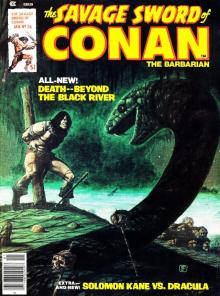 Beyond the Black River
Beyond the Black River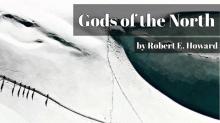 Gods of the North
Gods of the North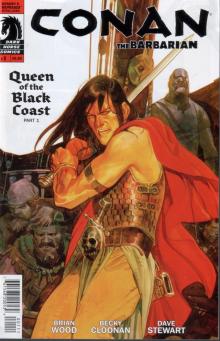 Queen of the Black Coast
Queen of the Black Coast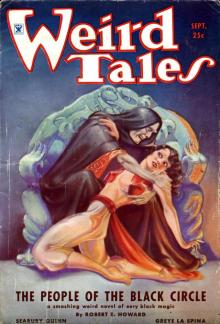 The People of the Black Circle
The People of the Black Circle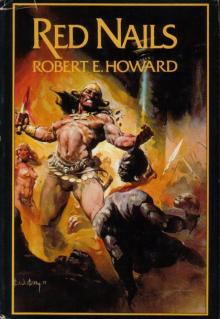 Red Nails
Red Nails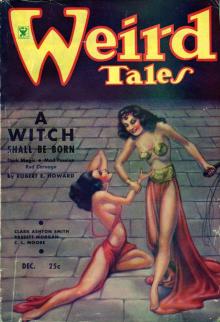 A Witch Shall Be Born
A Witch Shall Be Born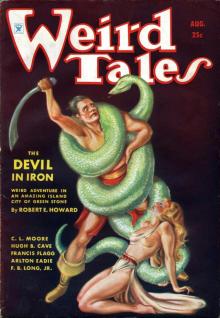 The Devil in Iron
The Devil in Iron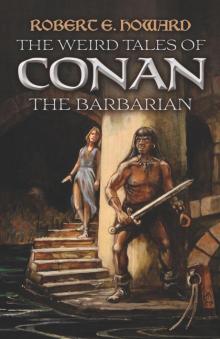 The Weird Tales of Conan the Barbarian
The Weird Tales of Conan the Barbarian The Bloody Crown of Conan
The Bloody Crown of Conan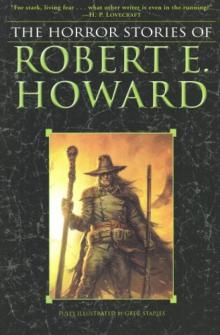 The Horror Stories of Robert E. Howard
The Horror Stories of Robert E. Howard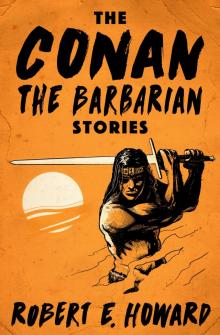 Conan the Conqueror
Conan the Conqueror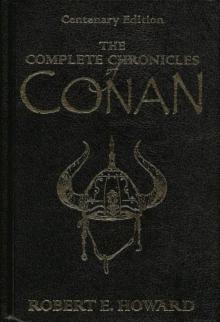 Conan the Barbarian
Conan the Barbarian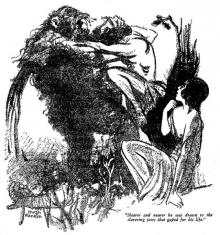 Shadows in the Moonlight
Shadows in the Moonlight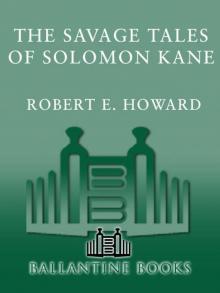 The Savage Tales of Solomon Kane
The Savage Tales of Solomon Kane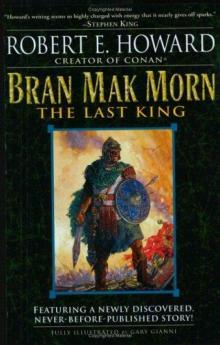 Bran Mak Morn: The Last King
Bran Mak Morn: The Last King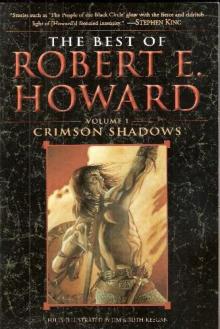 The Best of Robert E. Howard Volume One: Crimson Shadows
The Best of Robert E. Howard Volume One: Crimson Shadows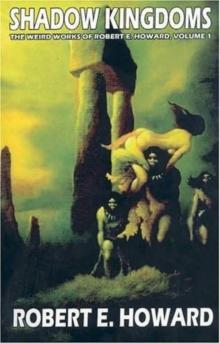 The Best of Robert E. Howard: Crimson Shadows (Volume 1)
The Best of Robert E. Howard: Crimson Shadows (Volume 1)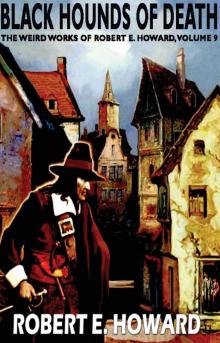 Black Hounds of Death
Black Hounds of Death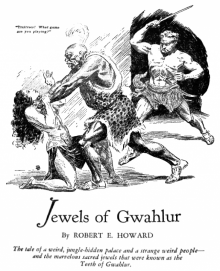 Jewels of Gwahlur
Jewels of Gwahlur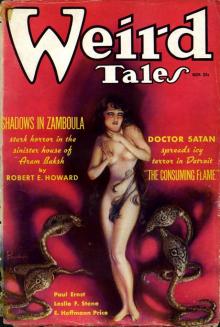 Shadows in Zamboula
Shadows in Zamboula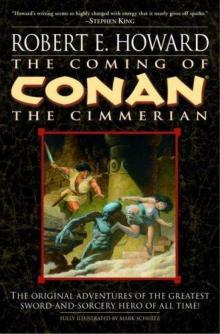 The Coming of Conan the Cimmerian
The Coming of Conan the Cimmerian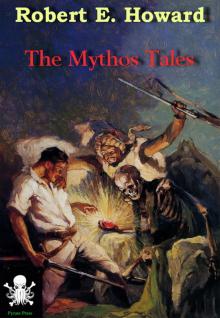 The Mythos Tales
The Mythos Tales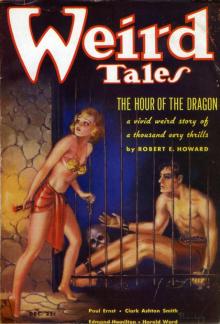 The Hour of the Dragon
The Hour of the Dragon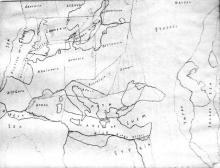 The Hyborian Age
The Hyborian Age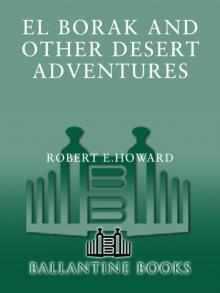 El Borak and Other Desert Adventures
El Borak and Other Desert Adventures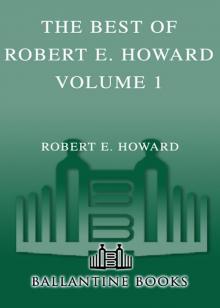 The Best of Robert E. Howard Volume 1 The Best of Robert E. Howard Volume 1
The Best of Robert E. Howard Volume 1 The Best of Robert E. Howard Volume 1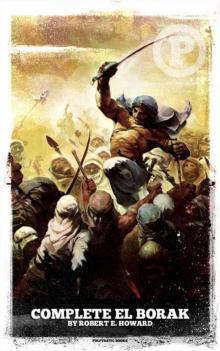 El Borak: The Complete Tales
El Borak: The Complete Tales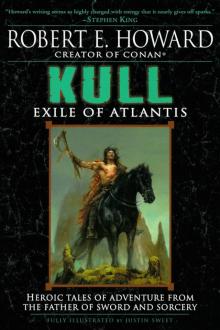 Kull: Exile of Atlantis
Kull: Exile of Atlantis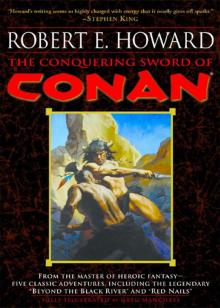 The Conquering Sword of Conan
The Conquering Sword of Conan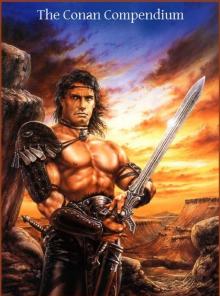 The Conan Compendium
The Conan Compendium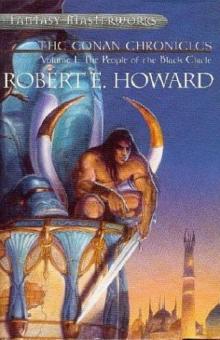 The Conan Chronicles: Volume 1: The People of the Black Circle
The Conan Chronicles: Volume 1: The People of the Black Circle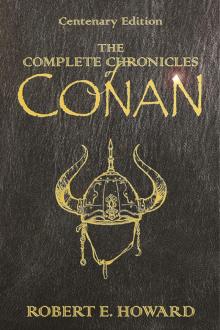 The Complete Chronicles of Conan: Centenary Edition
The Complete Chronicles of Conan: Centenary Edition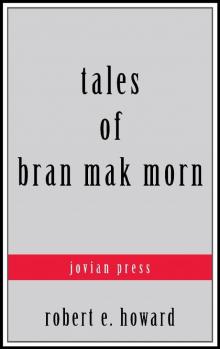 Tales of Bran Mak Morn (Serapis Classics)
Tales of Bran Mak Morn (Serapis Classics)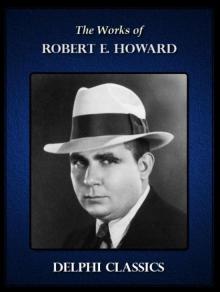 Delphi Works of Robert E. Howard (Illustrated) (Series Four)
Delphi Works of Robert E. Howard (Illustrated) (Series Four)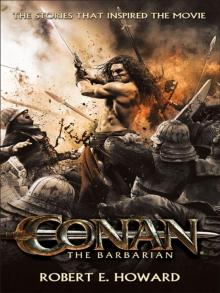 Conan the Barbarian: The Stories That Inspired the Movie
Conan the Barbarian: The Stories That Inspired the Movie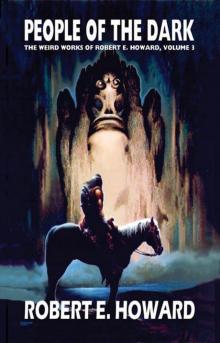 People of the Dark Robert Ervin Howard
People of the Dark Robert Ervin Howard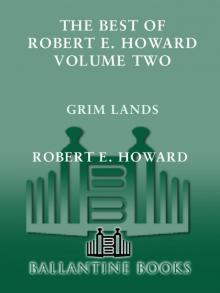 Grim Lands
Grim Lands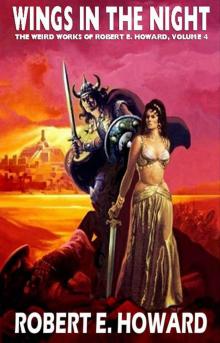 Wings in the Night
Wings in the Night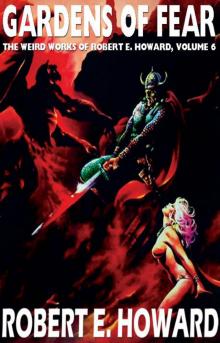 Gardens of Fear
Gardens of Fear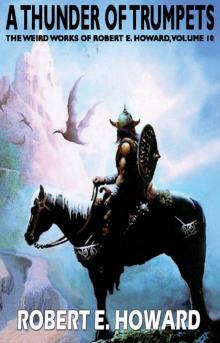 A Thunder of Trumpets
A Thunder of Trumpets Detective of the Occult
Detective of the Occult Sword Woman and Other Historical Adventures
Sword Woman and Other Historical Adventures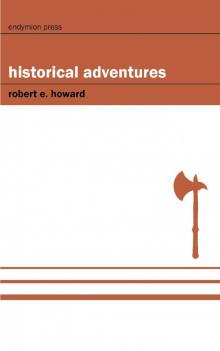 Historical Adventures
Historical Adventures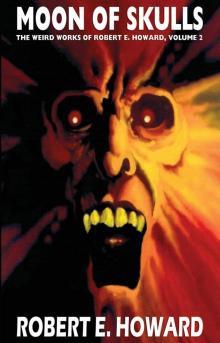 Moon of Skulls
Moon of Skulls The Robert E. Howard Omnibus: 97 Collected Stories
The Robert E. Howard Omnibus: 97 Collected Stories The Pirate Story Megapack: 25 Classic and Modern Tales
The Pirate Story Megapack: 25 Classic and Modern Tales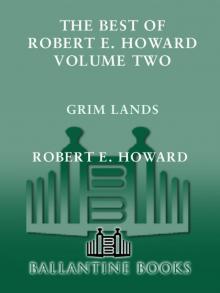 The Best of Robert E. Howard, Volume 2
The Best of Robert E. Howard, Volume 2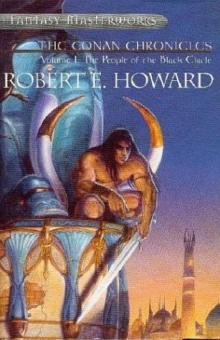 The Conan Chronicles, Vol. 1: The People of the Black Circle
The Conan Chronicles, Vol. 1: The People of the Black Circle Sword Woman and Other Historical Adventures M
Sword Woman and Other Historical Adventures M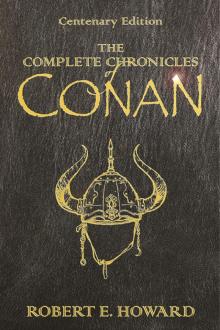 The Complete Chronicles of Conan
The Complete Chronicles of Conan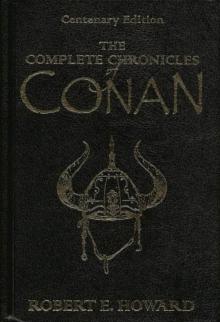 Conan the Barbarian: The Chronicles of Conan (collected short stories)
Conan the Barbarian: The Chronicles of Conan (collected short stories)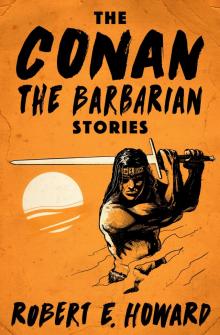 The Conan the Barbarian Stories
The Conan the Barbarian Stories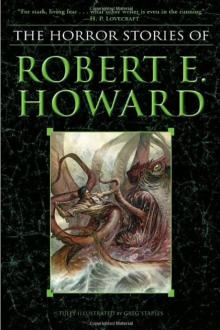 The Best Horror Stories of
The Best Horror Stories of Tigers Of The Sea cma-4
Tigers Of The Sea cma-4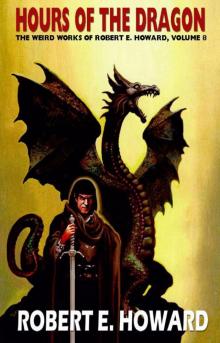 The Hours of the Dragon
The Hours of the Dragon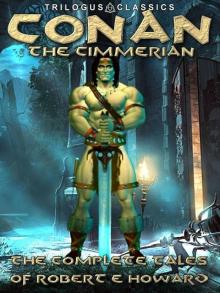 Conan the Cimmerian: The Complete Tales (Trilogus Classics)
Conan the Cimmerian: The Complete Tales (Trilogus Classics)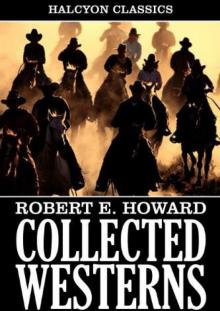 Collected Western Stories of Robert E. Howard (Unexpurgated Edition) (Halcyon Classics)
Collected Western Stories of Robert E. Howard (Unexpurgated Edition) (Halcyon Classics)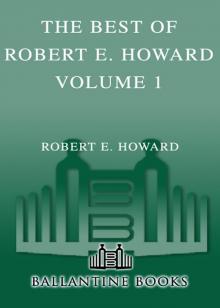 The Best of Robert E. Howard, Volume 1
The Best of Robert E. Howard, Volume 1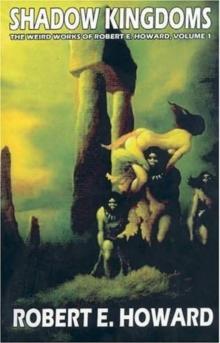 Shadow Kingdoms
Shadow Kingdoms